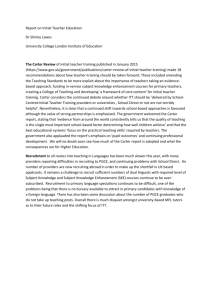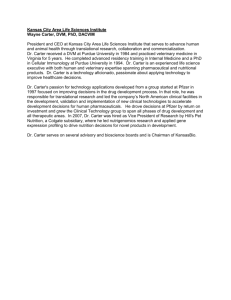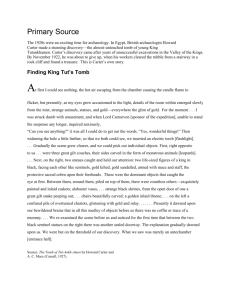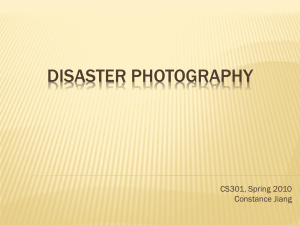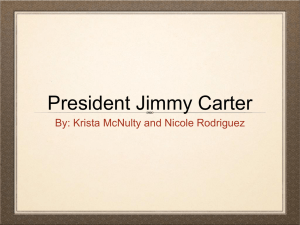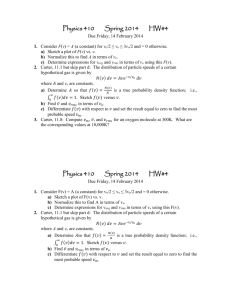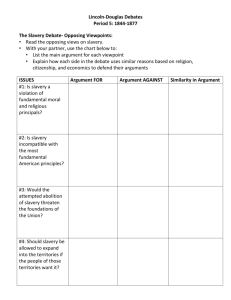HI Common Comments
advertisement
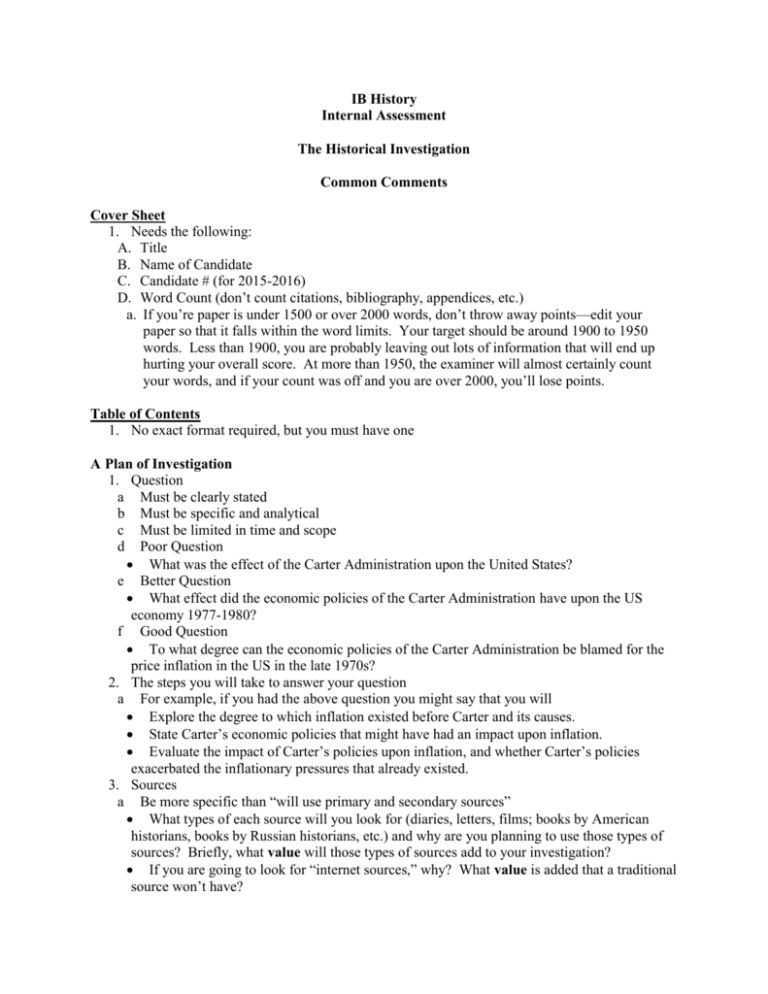
IB History Internal Assessment The Historical Investigation Common Comments Cover Sheet 1. Needs the following: A. Title B. Name of Candidate C. Candidate # (for 2015-2016) D. Word Count (don’t count citations, bibliography, appendices, etc.) a. If you’re paper is under 1500 or over 2000 words, don’t throw away points—edit your paper so that it falls within the word limits. Your target should be around 1900 to 1950 words. Less than 1900, you are probably leaving out lots of information that will end up hurting your overall score. At more than 1950, the examiner will almost certainly count your words, and if your count was off and you are over 2000, you’ll lose points. Table of Contents 1. No exact format required, but you must have one A Plan of Investigation 1. Question a Must be clearly stated b Must be specific and analytical c Must be limited in time and scope d Poor Question What was the effect of the Carter Administration upon the United States? e Better Question What effect did the economic policies of the Carter Administration have upon the US economy 1977-1980? f Good Question To what degree can the economic policies of the Carter Administration be blamed for the price inflation in the US in the late 1970s? 2. The steps you will take to answer your question a For example, if you had the above question you might say that you will Explore the degree to which inflation existed before Carter and its causes. State Carter’s economic policies that might have had an impact upon inflation. Evaluate the impact of Carter’s policies upon inflation, and whether Carter’s policies exacerbated the inflationary pressures that already existed. 3. Sources a Be more specific than “will use primary and secondary sources” What types of each source will you look for (diaries, letters, films; books by American historians, books by Russian historians, etc.) and why are you planning to use those types of sources? Briefly, what value will those types of sources add to your investigation? If you are going to look for “internet sources,” why? What value is added that a traditional source won’t have? 4. There should be NO thesis here! This section is supposedly written before you have started your investigation, so you don’t know the answer yet. If you have a hypothesis, make it clear that this is a hypothesis and not your argument. B Summary of the Evidence 1. Evidence in B a All “evidence” presented in section B should be relevant to proving your argument in D. If not, it is wasted space that is detracting from your argument. 2. Generalization a Don’t refer to the United States as simply “America.” “America” is both continents, North and South! b Don’t over-generalize: “the rich tried to...”; “Americans believed...”; etc. Better would be “rich businessmen such as J.P. Morgan tried to...”; “Many Americans, particularly the Nativists, believed...” etc. c Support your generalizations with specific facts For example, if you write: “many Americans thought immigrants were taking all the best jobs,” support this statement with facts that prove many Americans thought this (quotes from Nativists, etc.) 3. Quotation vs. Paraphrase a In general, paraphrase your sources in your own words rather than quote—in most cases you should be doing the writing, rather than quoting someone else’s words. b In general, quotations are appropriate when citing primary source evidence (ex. you want to preserve President Truman’s exact words to Molotov) when citing a historian’s opinion (though this would usually be more appropriate in section D. Analysis, rather than section B. Summary of Evidence) 4. Citations a Try using footnotes rather than parenthetical citation. b Avoid citation in middle of sentence. Poor: Nixon and Brezhnev signed the SALT I agreement in 1971,1 but Carter withdrew the SALT II agreement from the Senate’s consideration in 1979.2 Better: Nixon and Brezhnev signed the SALT I agreement in 1971.1 Carter, however, withdrew the SALT II agreement from the Senate’s consideration in 1979.2 5. There should be NO analysis in this section! C Evaluation of Sources 1. Origin—it is not enough to give the name of the author—who are they and what qualifications do they have relevant to your topic? Link this origin to either value or limitation, or preferably both. 2. Purpose—why was this source produced and what makes you think this is the reason? a Though an author will sometimes tell you why they produced a source (such as in the introduction to a book), usually you have to figure out the purpose based upon the type of source and its audience. b Link this purpose to either value or limitation or preferably both. 3. Origin, Purpose, Value, and Limitation should be analyzed, with each value and limitation related to either origin or purpose. 4. Make sure you explain your reasoning. a Poor: “As this is a speech by President George H.W. Bush, it is valuable to my investigation.” b Good: “As this is a speech by President George H.W. Bush, it gives insight into the ways in which the leader of the United States during the Persian Gulf War justified his country’s attack upon Iraq.” D Analysis 1. Don’t put evidence in D that was not cited in B, and do not simply restate evidence that was in B—there must be analysis here (i.e. possible answers to your question) 2. Don’t forget to include any arguments that conflict with your own, particularly if they are arguments made by any of your sources (primary sources and historians). You need to show that you are aware of any controversy that exists and you have evidence/arguments that are more convincing than the opposing arguments. If you have just a one sided argument, you are not considering different interpretations an can earn no more than two points here. a Ex. of weak analysis: “The Civil War was caused entirely by the conflict over slavery because…” b Ex. of stronger analysis considering different interpretations: “Bentley and Hobson agree with most historians that slavery was key to the outbreak of the Civil War, and only 19th and early 20th century southern historians such as Smith argue that slavery was not the primary cause of the war. Nevertheless, the issues that Smith identifies as causal factors, such as a dispute over states-rights and tariffs, are definitely contributing factors to the war, as demonstrated by…Though these were definitely contributors to the outbreak of war, Bentley and Hobson are correct that slavery was the most important cause because…” 3. Address the value and limitations of your sources, as relevant to your argument. a Ex. “As a southern historian writing after the war, the stigma associated with slavery would naturally cause Smith to downplay its importance in the conflict. We cannot discount the other factors he identifies, however, as they have solid factual support. Furthermore, Bentley and Hobson agree that they were significant factors…” E Conclusion 1. Don’t introduce any new arguments in your conclusion. State your thesis (answer to your question) and the reasons for reaching this conclusion, as well as any counter-arguments and why you don’t find them as compelling as your thesis. F Sources 1. Bibliography a Must be alphabetical by author’s last name b Must cite sources consistently—I want you to use MLA because that is the method that your teachers at North Hills have trained you to use and hence you are less likely to make mistakes with it. c Don’t forget periods! You can lose an entire point for F just because of one missed period. d Make sure you have authors for all of your sources. e Make sure your sources are clearly scholarly. Wikipedia is NOT an acceptable source. Encyclopedia articles are not favored, though you might have one or two as long as you have several other sources that you depend upon more heavily. It is usually preferred to have more books and journal articles as sources than internet sources.
